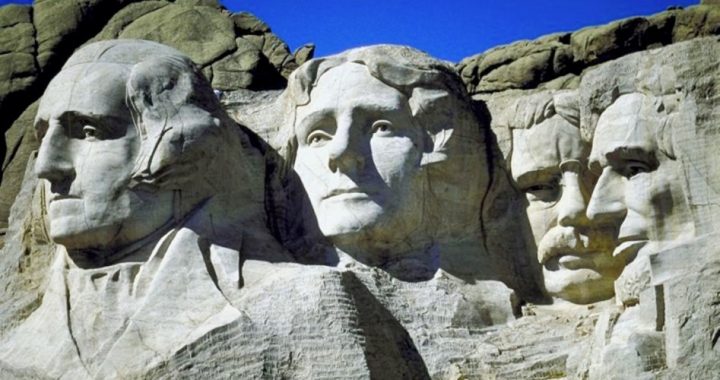
Reason one million (I exaggerate, but just a tad) for the United States to withdraw from the United Nations is the UN’s increasing interference in property rights, of both nations and individuals. The most recent example of this involves the Native American tribes of the United States. According to the United Nations, the United States government should return Mt. Rushmore to the Native American tribes.
Agency France-Presse reports:
Mt. Rushmore Site Should Be Returned To Indigenous Native American Tribes, U.N. Official Says.… James Anaya, a U.N. special rapporteur on the rights of indigenous people, completed a fact-finding mission on Friday that included meetings with a number of Native American tribal leaders as well as White House officials. His investigation led him to suggest that the United States take additional steps to repair the nation’s legacy of oppression against Native Americans. He’ll officially propose the plan in an upcoming report.
When the UN’s James Anaya visited the United States for a 12-day tour to assess whether the United States was progressing with the United Nations Declaration on the Rights of Indigenous Peoples, endorsed by President Obama, he seemed to be purposefully provoking. He referenced Mt. Rushmore and claimed it should be “restored as Native American tribal lands,” before adding, “The sense of loss, alienation and indignity is pervasive throughout Indian country. It is evident that there have still not been adequate measures of reconciliation to overcome the persistent legacies of the history of oppression, and that there is still much healing that needs to be done.”
Most critics of the United Nations recognize this as yet another ploy to interfere in issues of land rights. The UN is not a proponent of individual ownership of land, asserting the following during a United Nations Conference on Human Settlements:
Land cannot be treated as an ordinary asset, controlled by individuals and subject to the pressures and inefficiencies of the market. Private land ownership is also a principal instrument of accumulation and concentration of wealth and therefore contributes to social injustice; if unchecked, it may become a major obstacle in the planning and implementation of development schemes. The provision of decent dwellings and healthy conditions for the people can only be achieved if land is used in the interest of society as a whole.
To this end, the UN has sought a rather gradual approach to eliminating property rights. In 2005, for example, it marginalized the Peace of Westphalia, a 300-year-old collection of treaties that ended the Thirty Years War and provided sovereignty to the nations within the Holy Roman Empire, allotting them freedom from outside control. The United Nations virtually replaced the Peace of Westphalia with the Responsibility to Protect doctrine, which mandates that the UN can intervene in countries’ affairs and that has been used by both NATO and the United States to launch attacks.
The Daily Bell explains:
It has been noted that the Peace of Westphalia actually came to an end when the UN approved R2P, the “Responsibility to Protect” doctrine. This mandate is based on the idea that states have a primary role to play in shielding their populations from genocide. If the state abdicates this role, the “international community” should provide additional resources from mediation to political structures. Finally, if genocide is still threatened, the larger community must use diplomatic and even military action to ensure that civilians are safe.
With this doctrine in place no sovereign state can truly be said to exist anymore. In the place of sovereignty is the UN itself and its member states with amorphous responsibilities to police each other’s sociopolitical activities with an eye to determining whether any state is committing actionable genocide.
In addition to enacting Responsibility to Protect, the UN violates land rights with Agenda 21. The New American’s William Jasper wrote of Agenda 21 in February, explaining that the plan is about UN global control of virtually all activities:
The UN’s Agenda 21 is definitely comprehensive and global — breathtakingly so. Agenda 21 proposes a global regime that will monitor, oversee, and strictly regulate our planet’s oceans, lakes, streams, rivers, aquifers, sea beds, coastlands, wetlands, forests, jungles, grasslands, farmland, deserts, tundra, and mountains. It even has a whole section on regulating and “protecting” the atmosphere. It proposes plans for cities, towns, suburbs, villages, and rural areas. It envisions a global scheme for healthcare, education, nutrition, agriculture, labor, production, and consumption — in short, everything; there is nothing on, in, over, or under the Earth that doesn’t fall within the purview of some part of Agenda 21.
Agenda 21 has impacted Americans in cities across the nation. Landowners in Houston County, Minnesota, for example, are fighting for the rights to their land against a County Commissioner who has called the Constitution an “old document.” The struggle is over updates to the Land Use Plan brought on by the United Nations’ Agenda 21.
In 2007, a newlywed couple was sued by Houston County, enforcing the new Land Use Plan after the couple legally purchased a home. They were given just four options to “settle the situation.” They could either move their house 50 feet, purchase another 32 acres of land, sell their property to a neighbor, or simply tear the whole house down.
Instead, the couple opted to appeal the ruling in the Minnesota Supreme Court, which refused to even hear their case, forcing them to ultimately sell their property.
Apparently there are over 50 similar situations taking place in the area, according to county records, wherein landowners are being “denied rights guaranteed by the Constitution.”
The UN’s focus on indigenous rights is just another layer being added to the anti-property rights agenda that the UN has embraced. The goal seems to be to destabilize the concept of rights by creating friction between the indigenous tribal peoples and other citizens in the hope of being able to exploit a politically correct view of rights to undermine private property rights.
From a UN cosponsor press release issued on May 7, the methodology seems clear:
First Peoples Worldwide At the UN Permanent Forum On Indigenous Issues.… The UNPFII is a body of the UN that deals specifically with Indigenous peoples’ issues. This year’s theme will be “The Doctrine of Discovery: its enduring impact on Indigenous peoples and the right to redress for past consequences”, which will draw on articles 28 and 37 from the UN Declaration of the Rights of Indigenous Peoples (UNDRIP).…
This year’s Permanent Forum will also cover the rights of Indigenous peoples to food and food security; the World Conference on Indigenous Peoples, which will be held in 2014 by the 65th General Assembly of the UN to share perspectives and best practices on the realization of indigenous peoples’ rights; a discussion of UNDRIP; and a dialogue with the UN Special Rapporteur on the rights of Indigenous peoples, James Anaya, and the Expert Mechanism on the Rights of Indigenous Peoples.
Even if Americans agree that indigenous groups are entitled to land that was once taken from them, which would logically include most of the landmass of the United States, the United Nations should certainly not be involved in such a debate.




